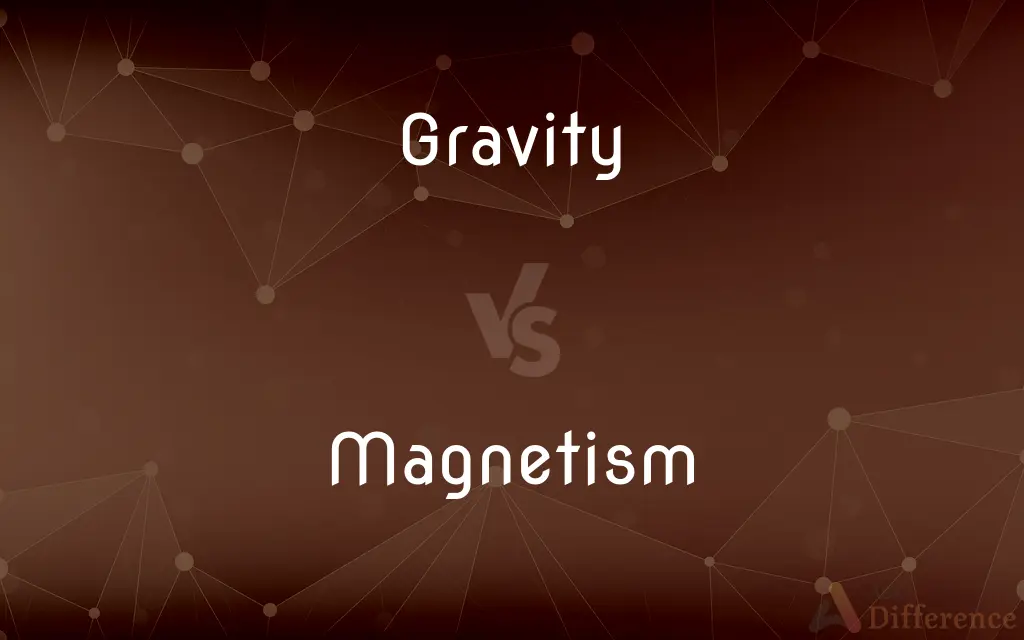Gravity vs. Magnetism — What's the Difference?
By Tayyaba Rehman & Maham Liaqat — Published on February 24, 2024
Gravity is a universal force of attraction between masses, fundamental to the structure of the universe, while magnetism is the force exerted by magnets when they attract or repel each other, crucial in various technological applications.

Difference Between Gravity and Magnetism
Table of Contents
ADVERTISEMENT
Key Differences
Gravity, a fundamental force, acts between all masses in the universe, dictating the motion of planets, stars, and galaxies, and influencing the structure of the cosmos itself. Its strength depends on the mass of the objects and the distance between them, following Newton's law of universal gravitation. Magnetism, on the other hand, arises from the motion of electric charges, affecting only materials sensitive to magnetic fields, such as iron, nickel, cobalt, and certain alloys. It plays a critical role in electrical and electronic devices, from simple compasses to advanced data storage systems.
Gravity is always attractive, pulling objects together, while magnetism can either attract or repel, depending on the orientation of the magnetic poles. This duality allows magnets to do work, like driving electric motors or levitating trains (maglev). Gravity’s influence is omnipresent but weak compared to electromagnetic forces, including magnetism, which is why we can use a small magnet to lift a paperclip against the entire Earth's gravitational pull.
The source of gravity is mass and energy, according to Einstein's theory of general relativity, which describes gravity not as a force in the traditional sense but as a curvature of spacetime caused by mass and energy. Magnetism, however, originates from the spin and orbital motion of electrons around an atom and the alignment of these elements in certain materials to create a magnetic field.
In terms of range, gravity has an infinite range, affecting objects across the vast expanse of the universe, whereas magnetism tends to have a more localized effect, with the strength of the magnetic force decreasing rapidly with distance from the source. Despite their differences, both forces are integral to the functioning of the universe and our daily lives. For instance, gravity is essential for keeping planets in orbit around the sun, while magnetism is key to the Earth's magnetic field, protecting us from solar radiation.
Applications of these forces vary widely. Gravity is crucial in astrophysics, planetary science, and for understanding the universe's large-scale structure. Magnetism finds its applications in technology, including electrical engineering, digital data storage (like hard drives), and medical devices (such as MRI machines).
ADVERTISEMENT
Comparison Chart
Nature
Universal force of attraction
Force from electric charges’ motion
Acts On
All masses
Magnetic materials
Force Type
Always attractive
Attractive or repulsive
Source
Mass and energy
Spin and orbital motion of electrons
Range
Infinite
Decreases with distance, relatively local
Influence
Structure of universe, planetary orbits
Electrical devices, Earth's magnetic field
Applications
Astrophysics, planetary science
Electrical engineering, data storage
Compare with Definitions
Gravity
A force attracting two masses.
Gravity keeps the planets orbiting around the sun.
Magnetism
A force from moving electric charges.
Magnetism allows a compass needle to point north.
Gravity
Essential for planetary orbits.
The Moon remains in Earth's orbit due to gravity.
Magnetism
Can attract or repel objects.
Opposite poles of magnets attract, like poles repel.
Gravity
Weak but universal force.
Gravity affects all objects, regardless of their size.
Magnetism
Localized effect but powerful.
Magnetic fields can lift objects many times their weight.
Gravity
Explained by Einstein's theory of general relativity.
Gravity bends the fabric of spacetime around Earth.
Magnetism
Essential in technology.
Hard drives store data using magnetic fields.
Gravity
Influences the large-scale structure of the universe.
Gravity causes galaxies to cluster.
Magnetism
Originates from electron motion.
Electrons spinning around an atom create magnetic moments.
Gravity
The natural attraction between physical bodies, especially when one of the bodies is a celestial body, such as the earth.
Magnetism
The branch of science that studies magnetism
Gravity
Gravitation, the universal force exercised by two bodies onto each other.
Magnetism
The class of phenomena exhibited by a magnetic field.
Gravity
The state of having weight; beaviness; as, the gravity of lead.
Magnetism
The study of magnets and their effects.
Magnetism
The science which treats of magnetic phenomena.
Common Curiosities
How do magnets work?
Magnets work by aligning the magnetic moments of electrons in materials, creating a magnetic field that can attract or repel certain metals.
What is the main difference between gravity and magnetism?
Gravity is a universal force acting between all masses, always attracting, while magnetism affects only magnetic materials and can both attract and repel.
Why is gravity considered a weak force?
Compared to electromagnetic and nuclear forces, gravity is much weaker; it's significant only at large masses or cosmic distances.
Is Earth's magnetic field related to gravity?
Earth's magnetic field is generated by movements in its core, independent of gravity, but both are essential for life on Earth by providing orientation and protection from solar radiation.
How do gravity and magnetism influence life on Earth?
Gravity holds the atmosphere and oceans in place and influences climate, while Earth's magnetic field protects against solar and cosmic radiation.
Can we use magnetism to counteract gravity?
In specific applications like maglev trains, magnetic forces can counteract gravity to achieve levitation and frictionless movement.
Are there materials that can block gravity or magnetism?
While there's no material that can block gravity, materials like mu-metal can shield against magnetic fields.
What role does gravity play in the universe's expansion?
Gravity acts as the attractive force that shapes the structure of the universe, influencing the expansion rate and the clustering of galaxies.
Can magnetism affect gravity?
Magnetism does not directly affect gravity, as they are distinct forces; however, both contribute to the universe's physical phenomena.
How are gravity and magnetism measured?
Gravity is measured using gravimeters, which detect variations in gravitational pull, while magnetism is measured with magnetometers, detecting strength and direction of magnetic fields.
Share Your Discovery

Previous Comparison
Monohydrate Creatine vs. Micronized Creatine
Next Comparison
Fuel vs. GasAuthor Spotlight
Written by
Tayyaba RehmanTayyaba Rehman is a distinguished writer, currently serving as a primary contributor to askdifference.com. As a researcher in semantics and etymology, Tayyaba's passion for the complexity of languages and their distinctions has found a perfect home on the platform. Tayyaba delves into the intricacies of language, distinguishing between commonly confused words and phrases, thereby providing clarity for readers worldwide.
Co-written by
Maham Liaqat















































